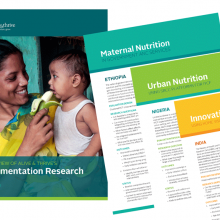Journal article
Apr 22 2021

Old Tricks, New Opportunities: How Companies Violate the International Code of Marketing of Breast-Milk Substitutes and Undermine Maternal and Child Health during the COVID-19 Pandemic (Ching, C., 2021. Int'l Journal of Environmental Research and Pub Hth)
An analysis reveals that breastmilk substitutes companies are using health claims, misinformation about breastfeeding, digital marketing, and promotional tactics such as donations and services to capitalize on families’ COVID-19 fears to undermine breastfeeding and sell products.
Journal article
Feb 08 2021

Advice to use infant formula and free samples are common in both urban and rural areas in China: A cross-sectional survey (Li, J., 2021. Public Health Nutrition)
Breastmilk substitute (BMS) companies are targeting mothers using aggressive and unethical marketing strategies that violate the WHO Code in both urban and rural areas in China, this study reveals.
Journal article
Dec 10 2020

Assessing the Economic Feasibility of Assuring Nutritionally Adequate Diets for Vulnerable Populations in Uttar Pradesh, India: Findings from a “Cost of the Diet” Analysis (Kachwaha, S., 2020. Current Developments in Nutrition)
This study conducted surveys in Uttar Pradesh, India, to examine food prices and consumption patterns.
Journal article
Dec 08 2020

Can complex programs be sustained? A mixed methods sustainability evaluation of a national infant and young child feeding program in Bangladesh and Vietnam (Moucheraud, C., 2020. BMC Public Health)
This study evaluates the sustainability of activities introduced during A&T implementation (2009–2014) in Bangladesh and Vietnam, revealing that multiple activities, such as mass media campaigns, policy and advocacy activities, and social mobilization activities were integral to the program’s
Journal article
Dec 08 2020

Childhood stunting and wasting in Myanmar: Key drivers and implications for policies and programmes (Blankenship, J., 2020. Maternal & Child Nutrition)
Findings indicate that the key drivers of child undernutrition in Myanmar, where prevalence of child stunting is 28% and wasting is 7%, are multifaceted and start in utero.
Brief, Handout
Oct 28 2020

An overview of Alive & Thrive's implementation research
Alive & Thrive's implementation research spans its program areas, seeking to answer "how" to implement effective interventions and policies. Active studies are detailed in the attached documents.

